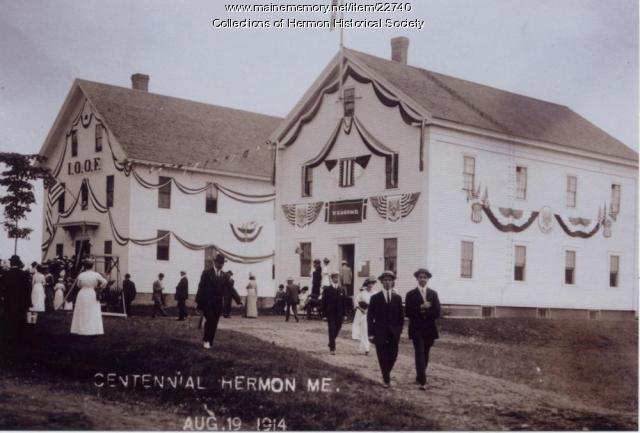Keywords: historical society
Item 31422
Scarborough Historical Society and Museum Building, ca. 1964
Contributed by: Scarborough Historical Society & Museum Date: circa 1964 Location: Scarborough Media: Photographic print
Item 14444
Bar Harbor Historical Society, ca. 1997
Contributed by: Bar Harbor Historical Society Date: circa 1997 Location: Bar Harbor Media: Wood
Item 38578
Assessor's Record, 485 Congress Street, Portland, 1924
Owner in 1924: Maine Historical Society Use: Office
Item 38579
Assessor's Record, 485 Congress Street, Portland, 1924
Owner in 1924: Maine Historical Society Use: Dwelling - Single family
Item 151384
Maine Historical Society, Portland, ca. 2015
Contributed by: Maine Historical Society Date: circa 2015 Location: Portland Client: Maine Historical Society Architect: Carol A. Wilson; Carol A. Wilson Architect
Item 151369
Chebeague Island Historical Society, Chebeague Island, 2001
Contributed by: Maine Historical Society Date: 2001 Location: Chebeague Island Client: Chebeague Island Historical Society Architect: Carol A. Wilson; UJMN and Carol A. Wilson Architects
Exhibit
MHS in Pictures: exploring our first 200 years
Two years after separating from Massachusetts, Maine leaders—many who were part of the push for statehood—also separated from Massachusetts Historical Society, creating the Maine Historical Society in 1822. The legislation signed on February 5, 1822 positioned MHS as the third-oldest state dedicated historical organization in the nation. The exhibition features MHS's five locations over the institution's two centuries, alongside images of leaders who have steered the organization through pivotal times.
Exhibit
Northern Threads: Two centuries of dress at Maine Historical
Organized by themed vignettes, Northern Threads shares stories about Maine people, while exploring how the clothing they wore reveals social, economic, and environmental histories. This re-examination of Maine Historical Society's permanent collection is an opportunity to consider the relevance of historic clothing in museums, the ebb and flow of fashion styles, and the complexities of diverse representation spanning 200 years of collecting.
Site Page
View collections, facts, and contact information for this Contributing Partner.
Site Page
Bridgewater Historical Society
View collections, facts, and contact information for this Contributing Partner.
Story
From Naturalists to Environmentalists
by Andy Beahm
The beginnings of Maine Audubon in the Portland Society of Natural History
Story
Share your COVID-19 story for future generations
by Steve Bromage and Jamie Rice, Maine Historical Society
Learn how you can share your stories on Maine Memory Network
Lesson Plan
Building Community/Community Buildings
Grade Level: 6-8
Content Area: Social Studies
Where do people gather? What defines a community? What buildings allow people to congregate to celebrate, learn, debate, vote, and take part in all manner of community activities? Students will evaluate images and primary documents from throughout Maine’s history, and look at some of Maine’s earliest gathering spaces and organizations, and how many communities established themselves around certain types of buildings. Students will make connections between the community buildings of the past and the ways we express identity and create communities today.
Lesson Plan
Grade Level: 9-12
Content Area: Social Studies
Maine's quest for statehood began in the years immediately following the American Revolution. Though the state of Massachusetts consented to the separation in 1819 and Maine would ultimately achieve statehood in 1820, Maine’s split from Massachusetts was not without controversy and was not universally supported by people living in Maine. Using primary sources, students will explore the arguments for and against Maine statehood. Students will gather evidence and arguments to debate the statement: It is in the best interests of the people of Maine for Maine to become its own state.






















